Grand Central Europe: July 21-27
Vienna * Wachau * Bohemia * Prague * Saxon Switzerland * Dresden * Berlin
IAC Journeys Visited Central Europe in Summer 2024! We’ll return with a new itinerary in Europe for families in the week following the 2025 International History Olympiad!
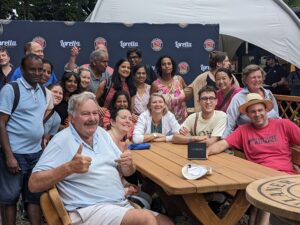
Goodbye from Berlin! Thanks for an incredible and successful tour. IAC Journeys will return in Summer 2025 with a new part of Europe to explore!
International Academic Competitions ran its first-ever weeklong tour for families (82 guests [28 of whom were competing students at IGC 2024] and 12 staff members made the trip) which saw us explore Central Europe in Summer 2024! Over the course of a week, we traveled from Vienna to Berlin with stops along the way in the Wachau region of Austria, Southern Bohemia, Prague, and Dresden. Designed to be an optional extension to the 2024 International Geography Championships in Vienna, the tour was open to all families with a child age 8-17, including those who were not participating in IGC 2024. Indeed, prior experience at IAC events at any level was not a prerequisite, but note that you must have had a child coming along on the tour to take part in it, as this tour was specifically designed for families with children who are interested in the geography, history, and culture of Central Europe. This rule will be in place for future IAC Journeys as well.
This being an IAC organized tour, there were a number of optional academic competitions with a history and geography focus that students (and family members!) could choose to compete in. Students could travel with the parents or guardians of another student, provided that both families provided permission for such an arrangement.
The tour was conducted primarily by bus and departed Vienna on Sunday morning, July 21 after IGC 2024 concluded the previous evening. The tour finished in Berlin on Sunday, July 28; families departed Berlin at any time on that day. The tour did not include travel to Vienna or from Berlin; participants needed to make separate travel arrangements from and to their homes, or wherever they were arriving from and departing to. Comparable arrangements will hold for future IAC Journeys as well.
The $1975 cost included all transport, accommodations, sightseeing organized as part of the tour, guides, competitions (all of which were open to family and friends), and breakfast each day. Tips were not expected at any point. The tour price did not include lunches or dinner, nor any additional sightseeing participants wished to do during their free time.
The hotels we stayed in were as follows:
21 July – Clarion Congress Hotel, Ceske Budejovice, Czech Republic
22-23 July – Hotel Opera, Prague, Czech Republic or Hotel Ibis Old Town or Hotel Ibis Wenceslas Square
24 July – Hotel Ibis Dresden Zentrum, Dresden, Germany
25-27 July – Hampton by Hilton Berlin City Centre Alexanderplatz, Berlin, Germany
For further questions, please contact IAC Executive Director, David Madden at david@iacompetitions.com.
Bon voyage (or Gute Reise / Šťastnou Cestu in German or Czech!)
Tour Information
Detailed Tour Schedule
Czech Republic Bee Results – July 22, 2024
Prague Treasure Hunt Results – July 23, 2024
Prague Treasure Hunt Answer Key
German Geography Bee Results – July 24, 2024
German History Bee Results – July 26, 2024
Final Tour Picture Quiz and Answer Key
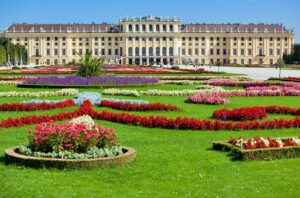
Schonbrunn Palace in Vienna
Day 1: Sunday, July 21 – Vienna > Wachau > Česky Krumlov > České Budějovice
After breakfast, we’ll depart for the scenic Wachau region of Lower Austria to the west of Vienna which was named a UNESCO World Heritage Site for its history and outstanding natural beauty. Traveling by bus will allow us to maximize our flexibility with stops at Krems and Dürnstein (where Richard the Lionheart was imprisoned). While traveling on the bus today, David will share stories of his experiences living in Vienna for 6 months as an AFS exchange student during his senior year of high school, and explain how you can either welcome an exchange student to your family or participate in AFS exchange student programs in high school or a gap year.
After lunch we’ll continue on to beautiful Melk Abbey before crossing into the Czech Republic. We’ll have dinner in picturesque Česky Krumlov (also a UNESCO World Heritage Site). After dinner, we’ll then continue on to nearby České Budejovice where we’ll stay for the night.
Day 2: Monday, July 22 – České Budějovice > Tabor > Prague
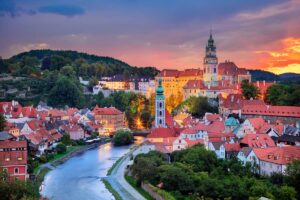
Česky Krumlov, Czech Republic
We’ll explore České Budějovice in the morning before heading for Prague around 11am. During the bus trip today, David will share his experiences of working as an interviewer for Princeton University, and offer some advice on the college admissions process for those who are interested. We’ll have lunch en route in Tabor before arriving in Prague around 3pm. After czeching (sorry…) into your hotel, you’ll have a chance to gain first impressions of one of the world’s most beautiful cities through a walking tour of the Old Town, including famous sites such as Old Town Square, the Charles Bridge, Wenceslas Square and more. Tonight we’ll then offer everyone the chance to take part in the Czech Republic Bee – a fun introduction to the history and geography, with questions played outside (weather permitting) on our battery-operated buzzer systems in the historical city center.
Day 3: Tuesday, July 23 – Prague
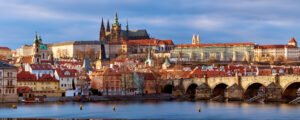
Panorama of Prague Castle
Today we’ll have a full day to explore Prague. We’ll begin by taking the tour bus to the top of Prague Castle, including St. Vitus Cathedral. We’ll then walk down the hill of the castle to the Lesser Town (Malá Strana), and then back across the Vltava River. After seeing many of the main sites, we’ll have some afternoon activities and tours to some sites that are a bit more eclectic or off the beaten path, such as the Dancing House. You’ll have some time on your own in the late afternoon, while we’ll recommend some traditional and modern Bohemian restaurants featuring the best in Czech cuisine for an early dinner. We’ll then have a Family Treasure Hunt in the evening – details revealed in Prague!
Day 4: Wednesday, July 24 – Prague > Saxon Switzerland > Dresden
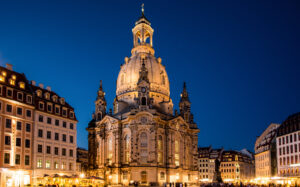
Frauenkirche, Dresden
This morning we’ll continue on towards Germany making our first stop at the National Park of Saxon Switzerland (in Saxony, not Switzerland – Switzerland is invoked in the name to describe its hilly and rural character) in the dramatic landscape of the Elbe Sandstone Mountains. We’ll then continue on to Dresden. For a city that was firebombed into rubble in the closing months of World War II (tip: read Kurt Vonnegut’s Slaughterhouse Five before your trip), Dresden has been amazingly well reconstructed and you will see why it was (and is) known as “Florence on the Elbe.” We’ll visit the Frauenkirche, the Zwinger Palace with the Old Masters Gallery (home to Raphael’s iconic Sistine Madonna), and the Grünes Gewölbe. Families who prefer can visit the Dresden Transport Museum. Dresden was the capital of the Kingdom of Saxony whose kings weren’t as proficient at war-making as the Prussians, but who were second to none in acquiring precious objects for their palaces and Treasure Chambers.
In the evening, we’ll offer a German Geography Bee as an optional competition to those who wish to compete, played outside (weather permitting) along the banks of the Elbe (perhaps one of the answers…).
Day 5: Thursday, July 25 – Dresden > Berlin
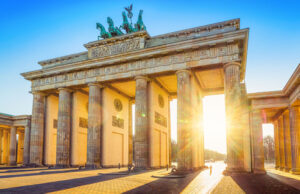
Brandenburg Gate, Berlin
We’ll continue on to Berlin this morning, a royal and imperial capital in the 18th and 19th centuries, the central node of much of 20th century history, and a vibrant world city in the 21st. After checking in to your hotel, we’ll dive right in and explore the city with an afternoon tour. Given Berlin’s turbulent history, vast layout (as a city, it covers over 8 times the area of Paris!), and flat topography, getting around by bike is the best way to see the historic center. For those who’d prefer an on-foot option, we’ll offer that as well. You’ll get a chance to see the Brandenburg Gate, remnants of the Berlin Wall, Checkpoint Charlie, the Reichstag building, the Holocaust Memorial, and numerous other sites in the district of Mitte, the historic center of the city.
In the evening, we recommend having dinner in Prenzlauer Berg, a trendy upscale district with numerous cafes and restaurants in what was once a neglected part of East Berlin. David, who lived in that part of Berlin in 2002, will give an optional brief tour for those interested, before pointing out some good places to go for dinner.
Day 6: Friday, July 26 – Berlin
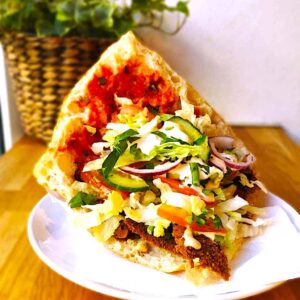
A classic overstuffed Berlin-style Döner Kebab
This morning we’ll take a tour of Berlin’s Friedrichshain-Kreuzberg district, a raucous microcosm of the city itself, which was located directly on the border between East and West Berlin. We’ll see the largest standing section of the Berlin Wall, which is now the world’s longest public art gallery. We’ll learn about how Berlin became the techno and clubbing capital of the world, inspiring musicians like U2 and Nena. But we’ll also delve into the complicated history and politics of refugees and immigrants in Germany in the heart of the largest Turkish community outside Turkey, and where thousands of Syrians and Ukrainians have also settled in recent years. Of course we’ll stop for a Döner Kebab and some Fladenbrot along the way!
In the afternoon, you’ll have free time to explore Berlin, but we recommend you take advantage of one or two of its many world-class museums. Depending on your interests, you could check out the Neues Museum with its Bust of Nefertiti, the Berlin Wall Museum at Checkpoint Charlie, the DDR Museum with its interactive exhibits on life in the former East Germany, the Neue Nationalgalerie with its 20th century art collection, or the Natural History Museum with its dinosaurs! You may also wish to tour the roof and cupola of the Reichstag building or visit Berlin’s historic zoo, next to the ruins of the Kaiser Wilhelm Memorial Church. If you’d prefer to go to a picturesque lake for an afternoon swim, we’ll meet at 4:30 to go to the Schlachtensee, where there’s a pleasant beer garden as well with traditional German food.
In the evening, we’ll play a German History Bee on the lawn in front of the Reichstag!
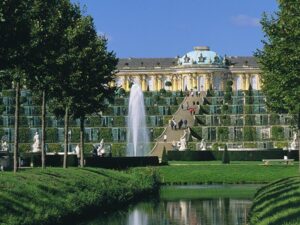
Sanssouci Palace overlooks the gardens in Potsdam
Day 7: Saturday, July 27 – Berlin and Potsdam
Today we’ll take the train and head out of Berlin to Potsdam, where we’ll tour the palaces of Frederick the Great and the Prussian royalty, such as Sanssouci and have a chance to stroll around the gardens of Germany’s (or at least Prussia’s) answer to Versailles. For those who are interested, you can continue on after lunch to see Schloss Cecilienhof where the Potsdam Conference took place in the Summer of 1945 which divided Europe and where the atomic bombing of Japan was approved.
Time permitting, you can also then visit the House of the Wannsee Conference, where plans for the Holocaust were made, which today exists as a memorial and museum. Or you can visit the Wannsee Lake Beach for a swim to relax after a busy day of touring.
On our last evening in Berlin, we’ll have a family dinner together at Loretta am Wannsee, a beautiful traditional Biergarten on the shores of Lake Wannsee in southwestern Berlin. Families can take part together in a Family Picture Quiz after dinner while enjoying dessert along the lake. Hope you were paying careful attention during the trip, as many of the sites will make a final appearance! David and Nolwenn (who got engaged in Berlin) will also offer some final travel tips, internship tips (David spent a summer as an intern working in the German Bundestag while at Princeton), and IAC competition tips for those who are interested during and after dinner.
Day 8: Sunday, July 28 – Berlin
Families are welcome to depart from Berlin at any point today. We’ll help give you directions to both Berlin Hauptbahnhof (the main train station) and Berlin Brandenburg International Airport as needed. If you are looking to stay on in Berlin, or continue your travels elsewhere in Germany or Europe, just let us know, and we’ll be happy to pass along some additional recommendations on places to see, stay, and eat.

